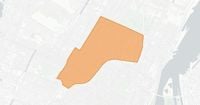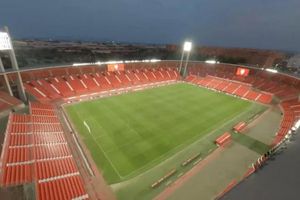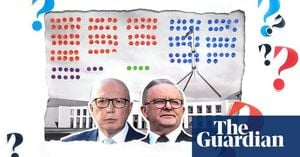Residents across Quebec cast their votes in the 2025 Federal election, with significant results emerging from Montreal and the surrounding areas. The election, held on April 28, 2025, saw various incumbents retain their seats while new contenders emerged victorious in several districts.
As the polls closed, CityNews provided live updates on the election results, showcasing an interactive map that tracked the progress in real time. By the evening of April 29, 2025, it became clear that some familiar names would continue to represent their constituencies, while others would be stepping into new roles.
In Laval, Fayçal El-Khoury successfully retained his seat in Laval-Les Îles, while Carlos Leitão emerged victorious in the previously vacant Marc-Aurèle-Fortin riding. Linda Lapointe secured her position in Rivière-des-Mille-Îles, and Annie Koutrakis held onto her seat in Vimy.
In Montreal, notable winners included Mélanie Joly in Ahuntsic-Cartierville, Abdelhaq Sari in Bourassa, and Anju Dhillon in Dorval–Lachine–LaSalle. Other incumbents such as Steven Guilbeault in Laurier–Sainte-Marie and Anthony Housefather in Mount Royal also retained their positions, reflecting a mix of continuity and change across the city.
However, the election was not without its challenges. Alexandre Boulerice, the New Democratic Party (NDP) incumbent in Rosemont—La Petite-Patrie, faced a national decline in his party's fortunes, as polls indicated that the NDP would drop from 24 seats to as low as nine. Despite this, Boulerice celebrated his re-election, becoming the first Quebec NDP MP to win five terms in the province's history. "I’m absolutely honoured to represent the people of Rosemont—La Petite-Patrie once again for a fifth mandate," Boulerice exclaimed to a cheering crowd. "We have a lot of work to do, but we will do the job no matter how many MPs we have, and we will be there for them."
While Boulerice's victory was a bright spot, the overall NDP performance was troubling, with the party's national strategy shifting from aiming for a significant role in a minority government to merely retaining official party status. Political analysts warned that this could mark one of the worst losses in the party's 64-year history.
In Rosemont—La Petite-Patrie, Boulerice garnered 18,887 votes, accounting for 40.46% of the total, while his closest competitor, Jean-Sébastien Vallée from the Liberal Party, received 14,562 votes (31.19%). Olivier Gignac from the Bloc Québécois trailed with 8,780 votes (18.81%). This strong showing underscored Boulerice's deep connection with his constituents, who praised his advocacy for initiatives like free dental care for the uninsured.
One voter, DJ Morales, highlighted the importance of the NDP's policies, saying, "For me, it was the first dental checkup I’d had in years. My rent has been increased every year for the last several years. Groceries are going up. The NDP is the last party that really fights for regular working persons." Boulerice's commitment to social issues resonated with many constituents, reinforcing his position as a vital voice for the working class.
As the night progressed, the results for other Montreal ridings began to unfold. In Hochelaga–Rosemont-Est, Marie-Gabrielle Ménard emerged victorious, while Eric St-Pierre won in Honoré–Mercier. Mario Beaulieu of the Bloc Québécois retained his seat in La Pointe-de-l’île, and Francis Scarpaleggia held onto his position in Lac-Saint-Louis.
Despite the NDP's struggles, the Bloc Québécois also faced challenges, with many of their candidates unable to secure wins in key ridings. The party's performance was particularly scrutinized, as political historians noted that the NDP's and Bloc's fortunes were closely tied to the shifting political landscape in Quebec.
In the South Shore, Yves-François Blanchet of the Bloc Québécois won in Beloeil–Chambly, while Alexandra Mendès retained her seat in Brossard–Saint-Lambert. Nathalie Provost succeeded in Châteauguay–Les Jardins-de-Napierville, and Jacques Ramsey emerged victorious in La Prairie–Atateken.
As the election results continued to roll in, the overall landscape of Canadian politics appeared to be shifting. The Liberals, who held 152 seats at Parliament's dissolution, were projected to maintain a commanding presence, with 139 races called in their favor and leading in 24 others. They amassed 6,206,123 votes, representing 42.87% of the popular vote.
The Conservatives were not far behind, securing 132 seats and leading in 17 other ridings with 6,041,434 votes (41.74%). Meanwhile, the Bloc Québécois managed to capture 22 races, with 1,038,222 votes (7.17%).
The NDP, however, struggled to break through, with only four races called in their favor and leading in three others, totaling 847,508 votes (5.85%). The Greens managed to secure one race with 167,512 votes (1.16%).
As the dust settled on the election, it became clear that many parties would need to reevaluate their strategies moving forward. Boulerice's victory, while significant for his riding, highlighted the broader challenges facing left-leaning parties in a changing political environment.
Political experts predict that the NDP will need to reconnect with its base and address the key issues of housing and healthcare that were largely overshadowed during the campaign. As Boulerice noted, "We will be watching over Mr. Carney to say ‘Be careful, don’t take away service to the public, for seniors, for the unemployed, for those awaiting visas or immigration permits." The resilience of the NDP in Quebec may depend on their ability to adapt and respond to the evolving needs of their constituents.




